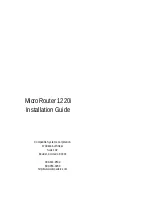
Chapter 2 - Getting Started
7
10Base-T Twisted-Pair Ethernet
To connect the router's Ethernet interface to twisted-pair Ethernet
cabling you will need an unshielded twisted-pair station cable that is
connected to a 10BaseT-compatible twisted-pair hub.
v
Note:
Ethernet cables and cable connectors are not supplied with
the MicroRouter product. Please contact your reseller or your
Compatible Systems representative for information on obtaining the
correct Ethernet cabling supplies.
Telco Line Connection Requirements
In order to connect to non-T1 wide area transmission lines, you must
connect the router’s secondary wide area port to a modem, 56K
CSU/DSU, or ISDN Terminal Adapter. Which of these devices you use
depends on the type of telco line.
v
Note:
Before attempting to connect the MicroRouter 1220i to a
leased telco line, use the loopback features of your CSU/DSU to check
the line. This can save you a considerable amount of time, since the
more equipment you have on the line, the more difficult it becomes to
determine where a problem is occurring.
The MicroRouter 1220i provides one high-speed V.35 synchronous
interface, and one RS-232 sync/async interface, each of which can be
independently configured for PPP, Frame Relay or SMDS operation.
The V.35 interface is capable of communicating to another router or a
PPP client machine over a 56K CSU/DSU, an ISDN Terminal Adapter,
or a T1 CSU/DSU. The RS-232 interface is capable of communicating
to another router or a PPP client machine over a modem, 56K
CSU/DSU, or ISDN Terminal Adapter.
V.35 Interface
The MicroRouter 1220i does not include a V.35 cable. These cables are
available from your reseller, or a number of other suppliers. The
MicroRouter 1220i has a female V.35 connector, as do virtually all line
communications devices. Thus, the V.35 cable required to connect to a
line communications device will usually have male connectors at both
ends. The pinouts for this cable are shown in Appendix B.














































